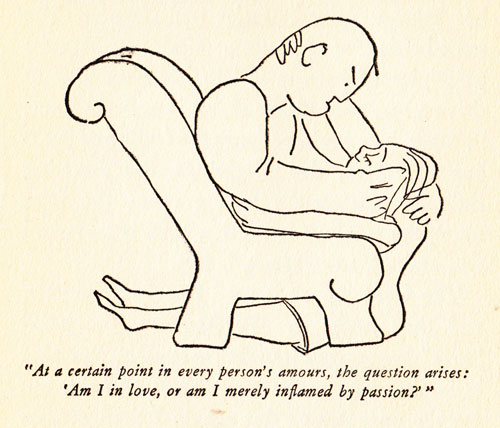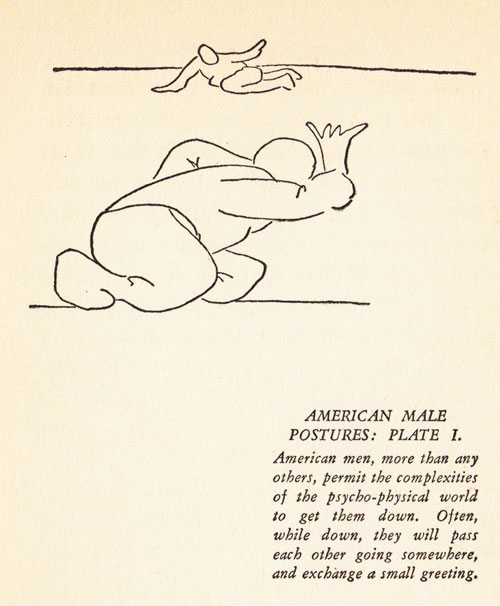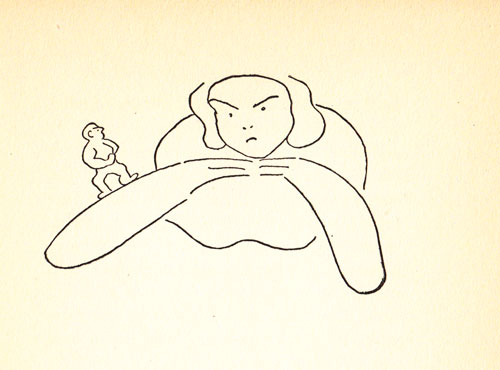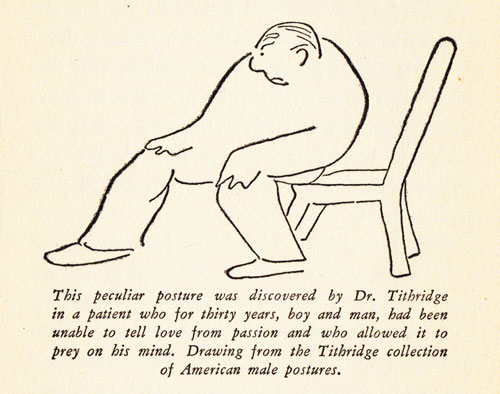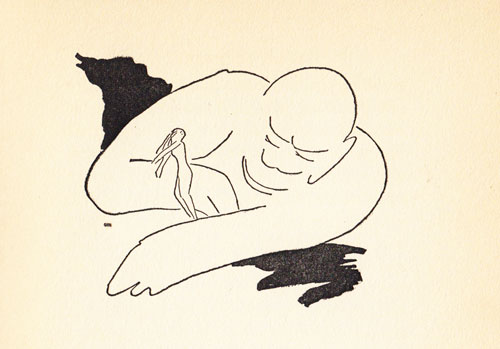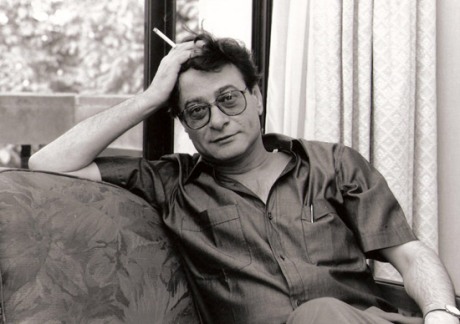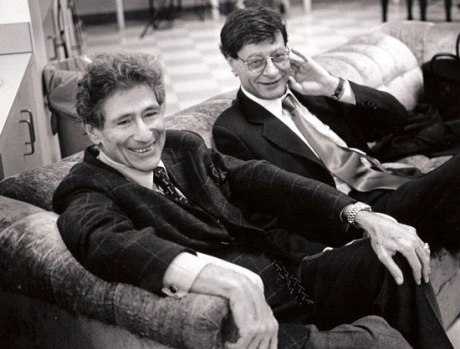“By and large, love is easier to experience before it has been explained — easier and cleaner.”
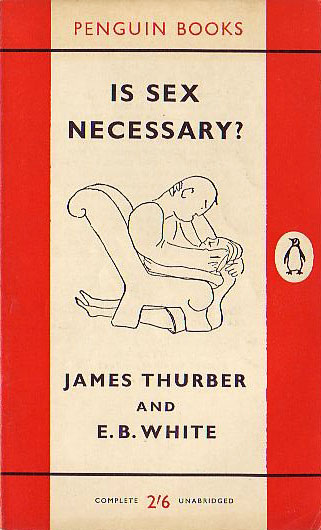 In 1927, E. B. White pulled some strings at The New Yorker, where he had been working since shortly after the legendary magazine’s birth in 1925, and arranged for his friend James Thurber to be hired as an editor. Over the decades that followed, Thurber would go on to produce some of the magazine’s most beloved literature and art. But arguably most delightful of all is his collaboration with White himself: Is Sex Necessary?: Or Why You Feel the Way You Do (public library), originally released in 1929 as White’s very first prose publication, is an unspeakably wonderful joint collection of prose poking fun at the conventions of marriage, romance, and love, but not without channeling through the charms of wit some profound truths about the human heart.
In 1927, E. B. White pulled some strings at The New Yorker, where he had been working since shortly after the legendary magazine’s birth in 1925, and arranged for his friend James Thurber to be hired as an editor. Over the decades that followed, Thurber would go on to produce some of the magazine’s most beloved literature and art. But arguably most delightful of all is his collaboration with White himself: Is Sex Necessary?: Or Why You Feel the Way You Do (public library), originally released in 1929 as White’s very first prose publication, is an unspeakably wonderful joint collection of prose poking fun at the conventions of marriage, romance, and love, but not without channeling through the charms of wit some profound truths about the human heart.
Featuring forty-two lovely drawings by Thurber, reminiscent in both style and cultural progressiveness of Kurt Vonnegut’s favorite Danish guide to sexuality and secretly, systematically picked up from the floor beneath Thurber’s desk by White, the essays explore such subjects as feminine types, the sexual revolution, the perils of marital claustrophobia, and frigidity in men. But perhaps most notable is a chapter titled “How to Tell Love from Passion.” It begins:
At a certain point in every person’s amours, the question arises: “Am I in love, or am I merely inflamed by passion?”
It is a disturbing question. Usually it arises at some inopportune moment: at the start of a letter, in the middle of an embrace, at the end of a day in the country. If the person could supply a direct, simple, positive answer — if he could say convincingly, “I am in love,” or, “This is not love, this is passion” — he would spare himself many hours of mental discomfort. Almost nobody can arrive at so simple a reply. The conclusion a man commonly arrives at, after tossing the argument about, is something after this fashion: “I am in love, all right, but just the same I don’t like the way I looked at Miriam last night.”
Largely to blame for the problem, White argues, is the fact that love seems to defy definition — which, granted, hasn’t precluded some of literary history’s greatest minds from having famously tried.
Even after one has experienced love, one finds difficulty defining it. Likewise, one may define it and then have all kinds of trouble experiencing it, because, once having defined it, one is in too pompous a frame of mind ever again to submit to its sweet illusion. By and large, love is easier to experience before it has been explained — easier and cleaner. The same holds true of passion. Understanding the principles of passion is like knowing how to drive a car; once mastered, all is smoothed out; no more does one experience the feeling of perilous adventure, the misgivings, the diverting little hesitancies, the wrong turns, the false starts, the glorious insecurity. All is smoothed out, and all, so to speak, is lost.
Despite the loosely defined catch-all readers and writers have mutually agreed upon when using the l-word, Thurber and White venture their very own definition, which they self-derisively call a “usual hazy interpretation” but which is nonetheless rather wonderful:
The strange bewilderment which overtakes one person on account of another person … the pleasant confusion which we know exists.
So how, then, does one identify true love when it presents itself? We return once again to the opening example of the letter-writing moment of doubt — dispelled, to the delight of the literarily inclined, by the tell-tale quality of punctuation choice:
Let us say you have sat down to write a letter to your lady. There has been a normal amount of preparation for the ordeal, such as clearing a space on the desk … and the normal amount of false alarms, such as sitting down and discovering that you have no cigarettes. (Note: if you think you can write the letter without cigarettes, it is not love, it is passion.) Finally you get settled and you write the words; “Anne darling.” If you like commas, you put a comma after “darling”; if you like colons, a colon; if dashes, a dash. If you don’t care what punctuation mark you put after “darling,” the chances are you are in love — although you may just be uneducated, who knows?
A literary inclination, however, turns out to be more of a disadvantage than advantage in matters of recognizing true love:
This vexing disbelief in one’s own illusion of love is experienced most alarmingly by persons of literary inclinations. Yet with them the reaction comes in quite the opposite manner. Writing is a form of sexual expression (Zaner goes further: he says writing is sex), and it takes just as much out of a person. Thus, a person with a bent for creative literature approaches the task of writing a love letter with an excitation of the spirit surpassing anything in the realm of pure eroticism. He anticipates it for hours, mulling over in his mind the possible material, enlarging on anecdotes, rounding off pledges of affection, sharpening similes, sharpening pencils; he comes to the writing of it with immense zeal and a rather nice control of lyrical prose; he ends on a splendidly poised and correctly balanced note of tenderness and faith and love; and then, having signed, sealed, and posted the missive, is suddenly overcome by the realization that by the very act of composition he has annulled the allure of the subject herself — cares no more about her, for the moment, than he does for an old piece of butcher’s twine, which, all in all, is so alarming a discovery that he usually gets a little bit sick thinking about it, and has to go out somewhere and hear some music.
And yet, as history’s famous epistolary couples can attest — just look at the love letters of Frida Kahlo and Diego Rivera, Virginia Woolf and Vita Sackville-West, Georgia O’Keeffe and Alfred Stieglitz, Charles and Ray Eames, Henry Miller and Anaïs Nin, Jean-Paul Sartre and Simone de Beauvoir, and Oscar Wilde and Lord Alfred “Bosie” Douglas — literature and love do go hand in hand. White, however, finds this literary love suspect:
I have seldom met an individual of literary tastes or propensities in whom the writing of love was not directly attributable to the love of writing.
A person of this sort falls terribly in love, but in the end it turns out that he is more bemused by a sheet of white paper than a sheet of white bed linen. He would rather leap into print with his lady than leap into bed with her. (This first pleases the lady and then annoys her. She wants him to do both, and with virtually the same impulse.)
Still, culture’s common cynicisms about love aren’t spared the snark:
The medical profession recognizes two distinct types of men: first, the type that believes that to love a woman is not to desire her; second, the type that believes that to desire a woman is not to love her. The medical profession rests.
White ends on a note of irreverent reflection on the very premise of the essay:
The fact of the matter is, it’s very difficult to tell love from passion. My advice to anyone who doesn’t feel sure of the difference between them is either to give them both up or quit trying to split hairs.
Months after Is Sex Necessary? was published, White would fall in love and marry his first and only wife, the literary agent Katharine Angell who had gotten him the New Yorker gig, to whom he would write many wonderful love letters until death did them part.
For a contemporary complement of no lesser charm, see Alain de Botton on how to think more — meaning, better — about sex and revisit Vonnegut’s vintage sexology of choice.
Donating = Loving
Bringing you (ad-free) Brain Pickings takes hundreds of hours each month. If you find any joy and stimulation here, please consider becoming a Supporting Member with a recurring monthly donation of your choosing, between a cup of tea and a good dinner:
| ♥ $7 / month♥ $3 / month♥ $10 / month♥ $25 / month |
![]()
You can also become a one-time patron with a single donation in any amount:
 Brain Pickings has a free weekly newsletter. It comes out on Sundays and offers the week’s best articles. Here’s what to expect. Like? Sign up.
Brain Pickings has a free weekly newsletter. It comes out on Sundays and offers the week’s best articles. Here’s what to expect. Like? Sign up.
Brain Pickings takes 450+ hours a month to curate and edit across the different platforms, and remains banner-free. If it brings you any joy and inspiration, please consider a modest donation – it lets me know I'm doing something right.

